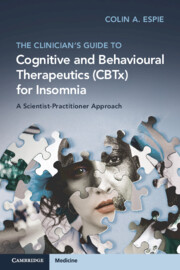 The Clinician's Guide to Cognitive and Behavioural Therapeutics (CBTx) for Insomnia
The Clinician's Guide to Cognitive and Behavioural Therapeutics (CBTx) for Insomnia from Section 4 - Treating Insomnia Using the CBTx Approach
Published online by Cambridge University Press: 20 December 2024
The role and importance of cognitive factors in the development and maintenance of insomnia have been well recognised for some time. Indeed, insomnia is characterised by several types of challenging thoughts, and these, coupled with hyperarousal, lead to difficulties sleeping. This chapter describes the role of cognitive factors in insomnia and describes in depth a range of cognitive techniques, their background, and the evidence for them. A number of cognitive techniques are described, including cognitive control, paradoxical intention, articulatory suppression, imagery-training, mindfulness, cognitive restructuring, and problem-solving. For each therapeutic, the reader is provided with specific instructions and narratives to follow to aid in their implementation when working with a patient.
To save this book to your Kindle, first ensure no-reply@cambridge.org is added to your Approved Personal Document E-mail List under your Personal Document Settings on the Manage Your Content and Devices page of your Amazon account. Then enter the ‘name’ part of your Kindle email address below. Find out more about saving to your Kindle.
Note you can select to save to either the @free.kindle.com or @kindle.com variations. ‘@free.kindle.com’ emails are free but can only be saved to your device when it is connected to wi-fi. ‘@kindle.com’ emails can be delivered even when you are not connected to wi-fi, but note that service fees apply.
Find out more about the Kindle Personal Document Service.
To save content items to your account, please confirm that you agree to abide by our usage policies. If this is the first time you use this feature, you will be asked to authorise Cambridge Core to connect with your account. Find out more about saving content to Dropbox.
To save content items to your account, please confirm that you agree to abide by our usage policies. If this is the first time you use this feature, you will be asked to authorise Cambridge Core to connect with your account. Find out more about saving content to Google Drive.